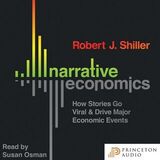

Narrative Economics
Voce: Susan Osman
Durata: 11h 7m
An audiobook narrated by esteemed BBC television journalist and anchor Susan Orman, with an introduction read by the author himself—Nobel Prize-winning economist and bestselling writer Robert Shiller
In a world in which internet troll farms attempt to influence foreign elections, can we afford to ignore the power of viral stories to affect economies? In this groundbreaking book, Nobel Prize–winning economist and
New York Times bestselling author Robert Shiller offers a new way to think about the economy and economic change. Using a rich array of historical examples and data, Shiller argues that studying popular stories that affect individual and collective economic behavior—what he calls "narrative economics"—has the potential to vastly improve our ability to predict, prepare for, and lessen the damage of financial crises, recessions, depressions, and other major economic events.
Spread through the public in the form of popular stories, ideas can go viral and move markets—whether it's the belief that tech stocks can only go up, that housing prices never fall, or that some firms are too big to fail. Whether true or false, stories like these—transmitted by word of mouth, by the news media, and increasingly by social media—drive the economy by driving our decisions about how and where to invest, how much to spend and save, and more. But despite the obvious importance of such stories, most economists have paid little attention to them.
Narrative Economics sets out to change that by laying the foundation for a way of understanding how stories help propel economic events that have had led to war, mass unemployment, and increased inequality.
The stories people tell—about economic confidence or panic, housing booms, the American dream, or Bitcoin—affect economic outcomes.
Narrative Economics explains how we can begin to take these stories seriously. It may be Robert Shiller's most important book to date.
Robert J. Shiller is a Nobel Prize–winning economist, the author of the
New York Times bestseller
Irrational Exuberance, and the coauthor, with George A. Akerlof, of
Phishing for Phools and
Animal Spirits, among other books (all Princeton). He is Sterling Professor of Economics at Yale University and a regular contributor to the
New York Times. He lives in New Haven, Connecticut. Twitter @RobertJShiller"An engaging scholarly study of the stories we tell about economic events—stories that go viral, for better or worse . . . . Of immense value to economists and policymakers working on the behavioral side of the field.""Shiller's thesis subsequently offers a predicative power that many contemporaneous studies lack. . . . [and] is timely because it exposes earlier studies on contagious phenomena."—Tony D. Sampson, American Literary History"Shiller is one of the world's most original economists. . . . Stories allow human beings to make sense of an uncertain world. But they also drive economies into booms and busts. Armed with this understanding, we gain a far richer understanding of how economies behave."—Martin Wolf, Financial Times"Finalist for the Best Book Published by a University Press, Digital Book World Awards""Longlisted for the getAbstract International Book Award""Winner of the PROSE Award in Economics, Association of American Publishers""Co-Winner of the Gold Medal in Economics, Axiom Business Book Awards""One of the Financial Times' Best Books of 2019: Economics""One of Prospect's Best Economics Books of 2019""An Economist Book of the Year""Mind-opening Business Books of 2019""One of Mint's Books of 2019 You Should Not Miss""A Project Syndicate Best Read in 2019""The idea that human behaviour can exert its own influence in the market is something that most traders would
buy into. . . . But in Narrative Economics, Shiller goes much broader and deeper, looking at how the stories we tell ourselves about the world drive our behaviour. . . . Economists, he argues, need to study this if they are to have any hope of doing a better job than they have in the past of predicting major events . . . and how people react to them."—Rana Foroohar, Financial Times"Economics is the study of people at work, but where are the people? Many a learned economist forgets all about them. Not Robert Shiller, the author of Narrative Economics, who believes that volatile human emotion counts for more than you think in the ostensibly objective valuation of stocks, bonds and buildings."—James Grant, Wall Street Journal"By emphasizing narratives, Shiller aims to mount a fundamental challenge to standard economic thinking—and to open up new territory for analysis. Narrative Economics was published before the novel coronavirus struck, but in a sense the pandemic is an important point in his argument's favor. . . . Shiller is right to suggest that narratives can be uniquely memorable and influential, because they focus people's attention and move their emotions in ways that abstractions usually do not."—Cass R. Sunstein, New York Review of Books"Shiller's book is a spectacular effort at unifying distinct fields and encouraging the profession to be ever more capacious in its approach to phenomena and methodology."—Mihir Desai, Times Higher Education
Pubblicato da: Princeton University Press
Titoli simili
Mostra tuttoCome funziona?
Crea un account.
Crea il tuo account gratuito qui.
Scarica l'app Voxa
Disponibile per Android e iPhone su Google Play o su App Store.
Prova gratuita per 7 giorni
Hai accesso a 100.000 titoli e all'intera esperienza Voxa.
Ascolta offline
Scarica i tuoi audiolibri preferiti e goditeli anche senza connessione a Internet.































